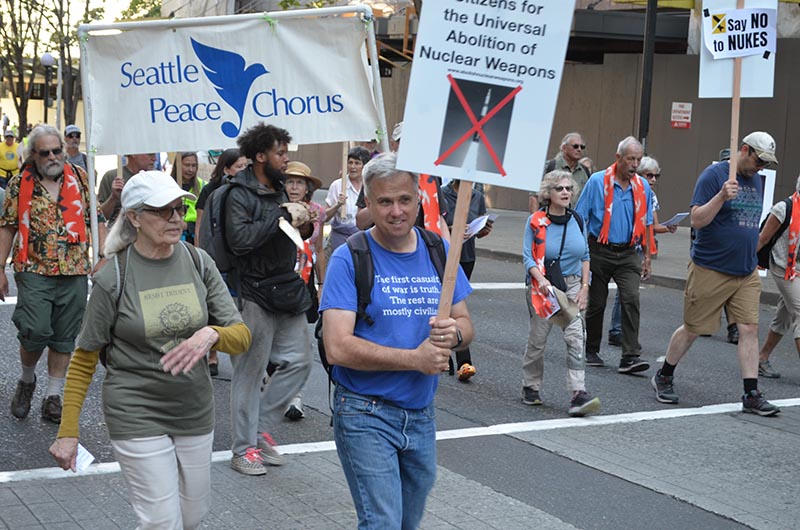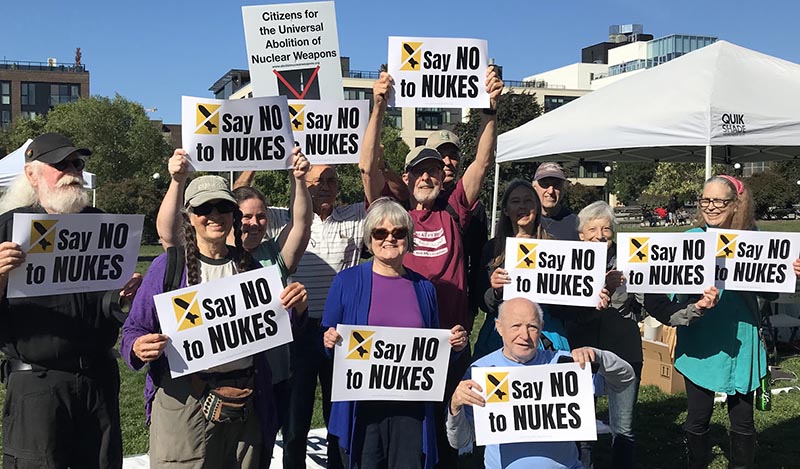
By David Swanson, September 24, 2022
Remarks in Seattle on September 24, 2022 at https://abolishnuclearweapons.org
I am so sick and tired of wars. I’m ready for peace. What about you?
I’m glad to hear it. But pretty much everybody is for peace, even the people who think the surest way to peace is through more wars. They have a peace pole in the Pentagon, after all. I’m pretty sure they ignore it more than worship it, although they do make a lot of human sacrifices for the cause.
When I ask a room of people in this country if they think any side of any war could be justified or ever has been justified, 99 times out of 100 I quickly hear shouts of “World War II” or “Hitler” or “Holocaust.”
Now I’m going to do something I don’t usually do and recommend that you watch a super long Ken Burns movie on PBS, the new one on the U.S. and the Holocaust. I mean unless you’re one of those weird dinosaurs like me who read books. Do any of you read books?
OK, the rest of you: watch this film, because it eliminates the number one reason people give for supporting the number one past war they support, which is the number one propaganda foundation for supporting new wars and weapons.
I expect the book readers already know this, but saving people from death camps was not part of WWII. In fact, the need to focus on waging a war was the top public excuse for not rescuing people. The top private excuse was that none of the world’s countries wanted the refugees. The film covers the insane debate that went on over whether to bomb the death camps to save them. But it does not tell you that peace activists were lobbying Western governments to negotiate for the freedom of the camps’ intended victims. Negotiations were held successfully with Nazi Germany over prisoners of war, just as recently negotiations have been held successfully with Russia over prisoner exchanges and grain exports in Ukraine. The trouble was not that Germany wouldn’t free the people — it had been loudly demanding that someone take them for years. The trouble was that the U.S. government did not want to free millions of people it considered a major inconvenience. And the trouble now is that the U.S. government does not want peace in Ukraine.
I do hope the U.S. will admit fleeing Russians and get to know them and like them so that we can work together with them before U.S. gets to the point of instituting a draft.
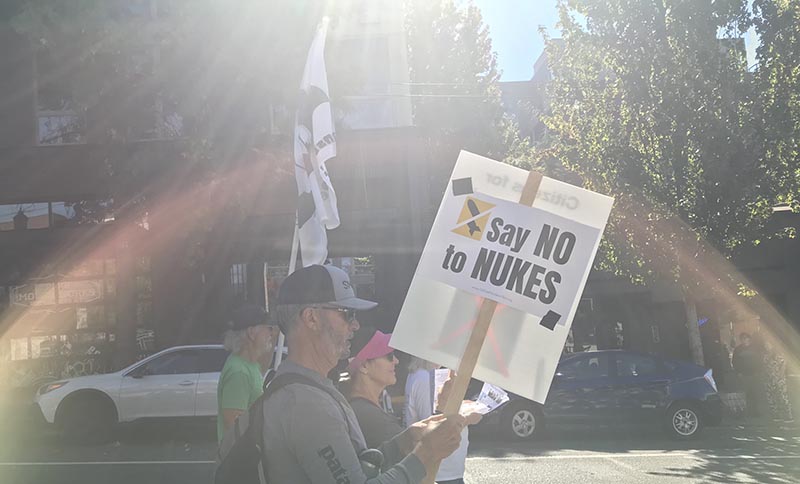
But while only a vocal minority in the United States wanted to help the victims of Nazism, by some measures we now have in the U.S. a quiet majority wanting to end the slaughter in Ukraine. But we’re not all quiet all the time!
A poll by Data for Progress of Washington’s Ninth Congressional District at the beginning of August found that 53% of voters said they would support the United States pursuing negotiations to end the war in Ukraine as soon as possible, even if it meant making some compromises with Russia. One of many reasons that I believe that number can go up, if it hasn’t already, is that in the very same poll 78% of voters were concerned about the conflict going nuclear. I suspect that the 25% or more who apparently worry about the war going nuclear but believe that’s a price worth paying to avoid any negotiating of peace lack a completely comprehensive understanding of what nuclear war is.
I think we have to go on trying every possible means of getting people to become aware of the dozens of near-miss accidents and confrontations, of how extremely unlikely it is that a single nuclear bomb will be launched rather than a great many in two directions, that the sort of bomb that destroyed Nagasaki is now merely the detonator for the sort of vastly larger bomb that nuclear war planners call small and usable, and of how even a limited nuclear war would create a global crop-killing nuclear winter that could leave the living envying the dead.

I understand that some people in and about Richland, Washington, are trying to change some names of things and generally scale back the glorification of having produced the plutonium that massacred the people of Nagasaki. I think we should applaud the effort to undo the celebration of a genocidal action.
The New York Times recently wrote about Richland but mostly avoided the key question. If it were true that bombing Nagasaki actually saved more lives than it cost, then it might still be decent for Richland to show some respect for the lives that were taken, but it would also be important to celebrate such a difficult accomplishment.
But if it is true, as the facts seem to clearly establish, that the nuclear bombs did not save more than 200,000 lives, did not in fact save any lives, then celebrating them is just evil. And, with some experts believing that the risk of nuclear apocalypse has never been greater than it is right now, it does matter that we get this right.
The Nagasaki bombing was actually moved up from August 11th to August 9th 1945 to decrease the likelihood of Japan surrendering before the bomb could be dropped. So, whatever you think of nuking one city (when many of the nuclear scientists wanted a demonstration on an uninhabited area instead), it’s hard to concoct a justification for nuking that second city. And in fact there was no justification for destroying the first one.
The United States Strategic Bombing Survey, set up by the U.S. government, concluded that, “certainly prior to 31 December, 1945, and in all probability prior to 1 November, 1945, Japan would have surrendered even if the atomic bombs had not been dropped, even if Russia had not entered the war, and even if no invasion had been planned or contemplated.”
One dissenter who had expressed this same view to the Secretary of War and, by his own account, to President Truman, prior to the bombings was General Dwight Eisenhower. General Douglas MacArthur, prior to the bombing of Hiroshima, announced that Japan was already beaten. The Chairman of the Joint Chiefs of Staff Admiral William D. Leahy said angrily in 1949, “The use of this barbarous weapon at Hiroshima and Nagasaki was of no material assistance in our war against Japan. The Japanese were already defeated and ready to surrender.”
President Truman justified the Hiroshima bombing, not as speeding the end of the war, but as revenge against Japanese offenses. For weeks, Japan had been willing to surrender if it could keep its emperor. The United States refused that until after the bombs fell. So, the desire to drop the bombs may have lengthened the war.
We should be clear that the claim that the bombs saved lives originally made slightly more sense than it does now, because it was about white lives. Now everyone’s too embarrassed to include that part of the claim, but goes on making the basic claim anyway, even though murdering 200,000 people in a war that could be over if you would just end it is perhaps the furthest thing imaginable from saving lives.
It seems to me that schools, rather than using mushroom clouds for logos, should focus on doing a better job of teaching history.
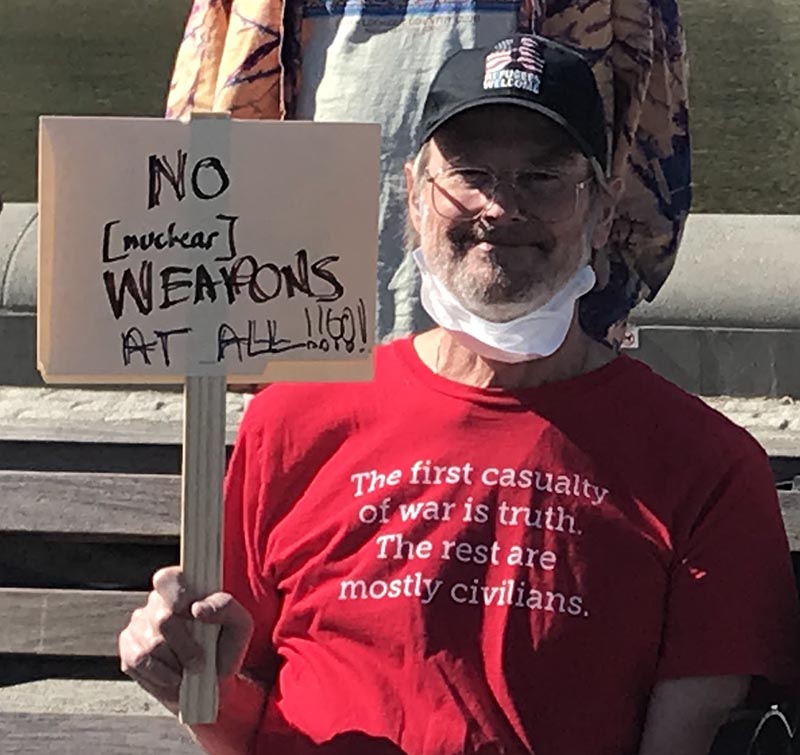
I mean all schools. Why do we believe in the end of the Cold War? Who taught us that?
The supposed ending of the Cold War never involved either Russia or the United States reducing its nuclear stockpiles below what it would take to destroy virtually all life on Earth multiple times — not in the understanding of scientists 30 years ago, and certainly not now that we know more about nuclear winter.
The Cold War’s supposed ending was a matter of political rhetoric and media focus. But the missiles never went away. The weapons never came off the missiles in the U.S. or Russia, as in China. Neither the U.S. nor Russia ever committed to not starting a nuclear war. The Treaty on Nonproliferation’s commitment appears never to have been an honest commitment in Washington DC. I hesitate even to quote it for fear someone in Washington DC will learn it exists and tear it up. But I’m going to quote it anyway. The treaty’s parties committed to:
“pursue negotiations in good faith on effective measures relating to cessation of the nuclear arms race at an early date and to nuclear disarmament, and on a treaty on general and complete disarmament under strict and effective international control.”
I’d like the U.S. government to sign onto a lot of treaties, including treaties and agreements it has torn up, such as the Iran agreement, the Intermediate Range Nuclear Forces Treaty, and the Anti-Ballistic Missile Treaty, and including treaties it has never signed, such as the Treaty on the Prohibition of Nuclear Weapons. But none of them are as good as existing treaties that we could demand compliance with, such as the Kellogg-Briand Pact which bans all war, or the Nonproliferation treaty, which requires complete disarmament — of all weapons. Why do we have these laws on the books that are so much better than the things we dream of legislating that we find it easy to accept the propaganda claim that they don’t actually really exist, that we should believe our televisions rather than out own lying eyes?
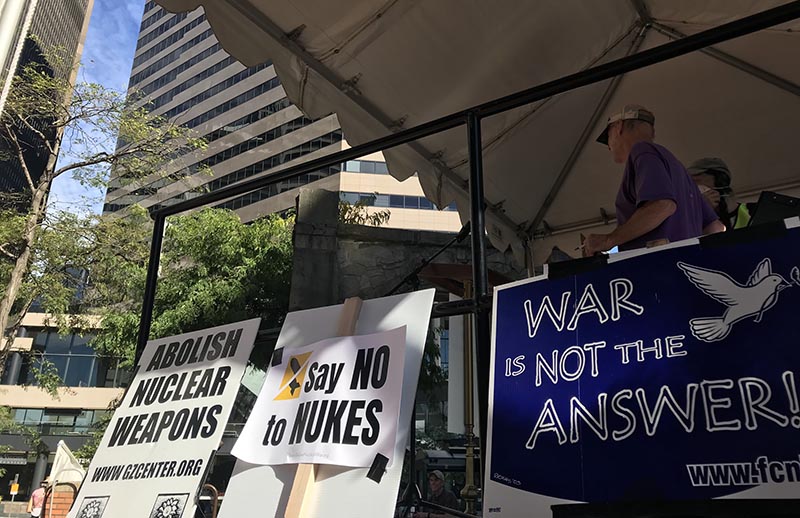
The answer is simple. Because the peace movement of the 1920s was stronger than we can imagine, and because the anti-war and anti-nuclear movement of the 1960s was pretty darn good as well. Both of those movements were created by ordinary people exactly like us, except with less knowledge and experience. We can do the same and better.
But we need to get mad about nuclear madness. We need to act as if every speck of beauty and wonder on Earth were threatened with swift annihilation because of the buffoonish arrogance of some of the dumbest people alive. We really are dealing with madness, and that means that we need to explain what’s wrong with it for those who will listen, while building a movement of political pressure for those who need to be pushed.
Why is it madness to want the biggest baddest weapons around, purely to deter irrational foreigners from unprovoked attacks like the one Russia was just so carefully provoked into?
(Presumably you all know that being provoked into something doesn’t excuse doing it but I’m probably required to say that anyway.)
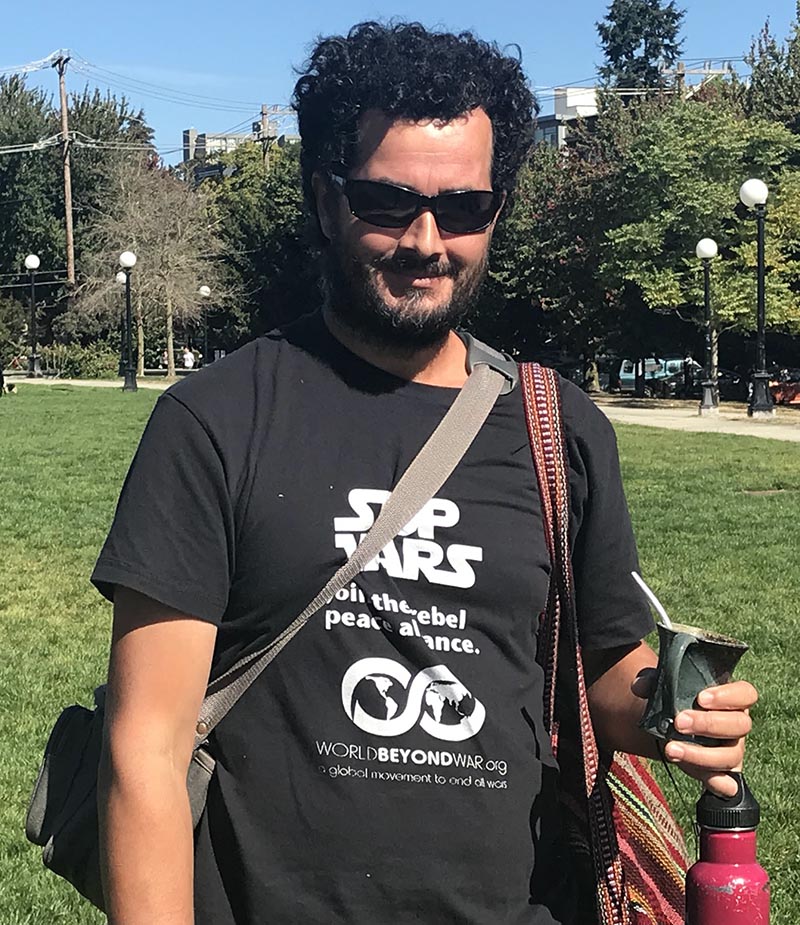
Here are 10 reasons wanting nukes is madness:
- Let enough years go by and the existence of nuclear weapons will kill us all by accident.
- Let enough years go by and the existence of nuclear weapons will kill us all through the act of some lunatic.
- There’s nothing a nuclear weapon can deter that the massive pile of non-nuclear weapons can’t deter better — but wait for #4.
- Nonviolent action has proven a more successful defense against invasions and occupations than the use of weapons.
- Threatening to use a weapon in order to never have to use it creates a high risk of disbelief, of confusion, and of the actual using of it.
- Employing large numbers of people to prepare to use a weapon creates momentum for using it, which is part of the explanation of what happened in 1945.
- Hanford, like many other places, is sitting on waste that some call an underground Chernobyl waiting to happen, and nobody has figured out a solution, but generating more waste is considered unquestionable by those in the grip of the madness.
- The other 96% of humanity is no more irrational than the 4% in the United States, but no less so either.
- When the Cold War can be restarted simply by choosing to notice that it never ended, and when it can turn hot in an instant, failing to radically change course is the definition of insanity.
- Vladimir Putin — as well as Donald Trump, Bill Clinton, two Bushes, Richard Nixon, Dwight Eisenhower, and Harry Truman — has threatened to use nuclear weapons. These are people who believe keeping their threats far more important than keeping their promises. The U.S. Congress openly claims the total inability to stop a president. A Washington Post columnist says there’s nothing to worry about because the U.S. has as many nukes as Russia has. The entirety of our world is not worth the gamble that some nuclear emperor in the U.S. or Russia or somewhere else won’t follow through.
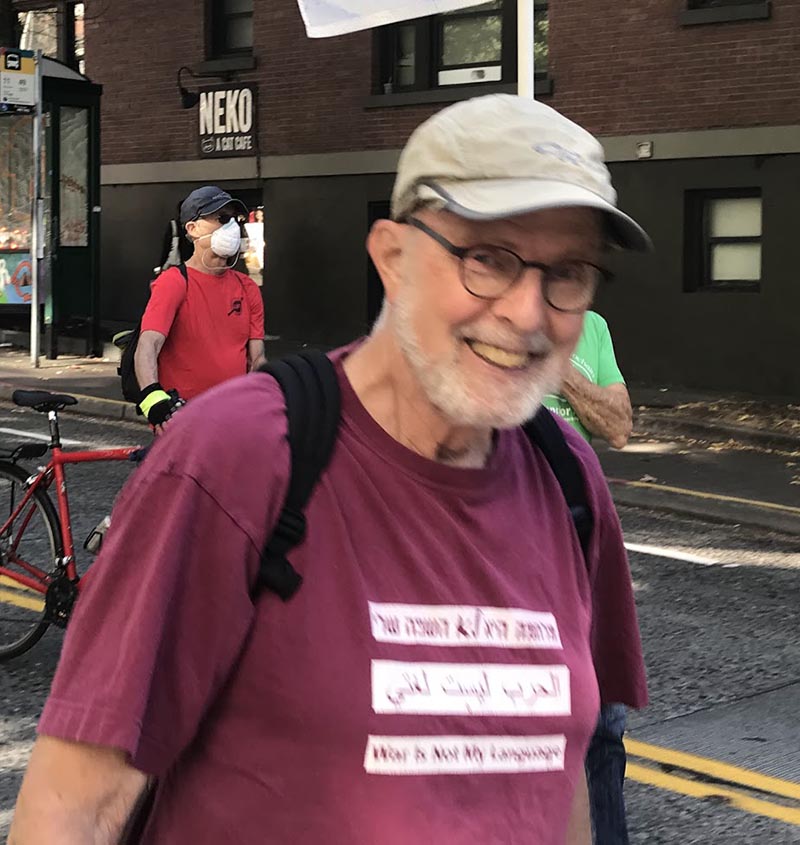
Madness has been cured many times, and nuclear madness need be no exception. Institutions that lasted for many years, and which were labeled inevitable, natural, essential, and various other terms of similarly dubious import, have been ended in various societies. These include cannibalism, human sacrifice, trial by ordeal, blood feuds, dueling, polygamy, capital punishment, slavery, and Bill O’Reilly’s Fox News program. Most of humanity wants to cure the nuclear madness so badly that they’re creating new treaties to do it. Most of humanity has passed up ever possessing nukes. South Korea, Taiwan, Sweden, and Japan have chosen not to have nukes. Ukraine and Kazakhstan gave up their nukes. So did Belarus. South Africa gave up its nukes. Brazil and Argentina chose not to have nukes. And although the Cold War was never ended, such dramatic steps were taken in disarmament that people imagined it was ending. Such awareness of the issue was created 40 years ago that people imagined the problem simply must be being solved. We’ve seen a glimmer of that awareness again this year.
When the war in Ukraine burst into the news this past spring, the scientists who keep the Doomsday Clock had already in 2020 moved the second-hand closer to apocalyptic midnight, leaving little room left to move it even closer later this year. But something changed at least noticeably in U.S. culture. A society that, while it does little of significance to slow climate collapse, is very openly aware of that apocalyptic future, suddenly began talking a little bit about the apocalypse on fast-forward that would be a nuclear war. The Seattle Times even ran this headline “Washington Stopped Planning for a Nuclear War in 1984. Should We Start Now?” It’s madness I tell you.
The Seattle Times promoted the belief in the lone nuclear bomb, and in individual solutions. There is very little reason to imagine that a single nuclear bomb will be launched without numerous accompanying bombs and numerous bombs responding almost immediately from the other side. Yet more attention is being paid right now to how one should behave when a single bomb hits than to far more likely scenarios. The City of New York put out a public service announcement telling residents to go indoors. Advocates for those without homes are outraged by the unfair impact of nuclear war, even though a real nuclear war will favor only cockroaches, and for a small percentage of what we spend preparing for it we could give every single person a house. We heard earlier today about the iodine pills solution.
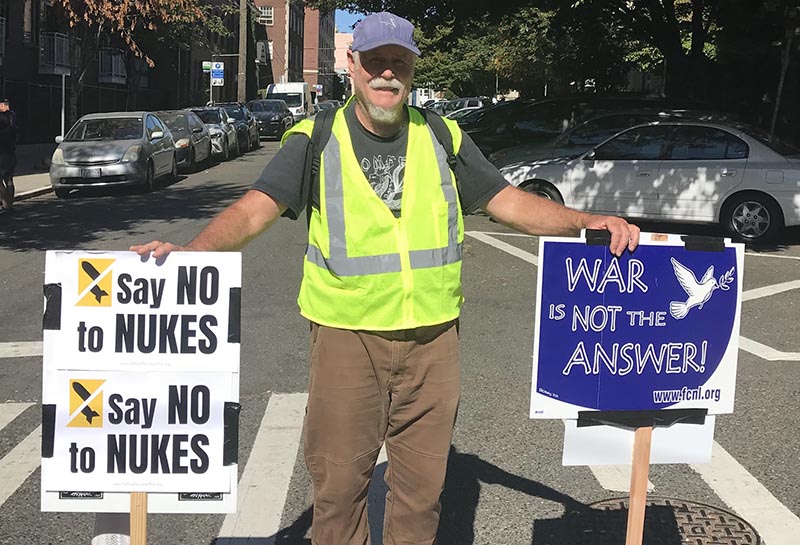
A non-individual response to this quintessentially collective problem would be to organize pressure for disarmament — whether joint or unilateral. Unilateral departure from madness is an act of sanity. And I believe we can do it. The people who organized this event today using abolishnuclearweapons.org can organize others. Our friends at Ground Zero Center for Nonviolent Action know exactly what they’re doing. If we need creative public art to get our message through, the Backbone Campaign from Vashon Island can handle it. Up on Whidbey Island, the Whidbey Environmental Action Network and their allies just kicked the military out of state parks, and the Sound Defense Alliance is working to get the ear-splitting death planes out of the skies.
While we need more activism, there is much more than we usually know already happening. At DefuseNuclearWar.org you’ll find planning underway across the United States for emergency anti-nuclear actions in October.
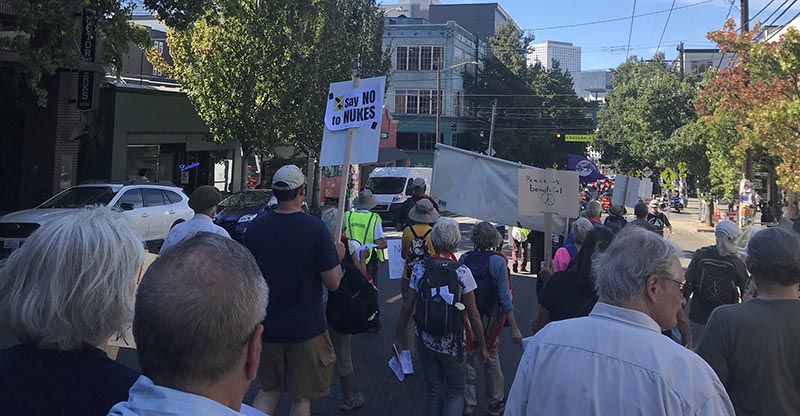
Can we get rid of nuclear weapons and keep nuclear energy? I doubt it. Can we get rid of nuclear weapons and keep mountainous stockpiles of non-nuclear weapons positioned on 1,000 bases in other people’s countries? I doubt it. But what we can do is take a step, and watch every subsequent step grow easier, because a reverse arms race makes it so, because education makes it so, and because momentum makes it so. If there’s anything politicians like better than incinerating entire cities it’s winning. If nuclear disarmament begins winning it can expect a lot more friends to climb aboard.
But right now there’s not a single U.S. Congress Member seriously sticking their neck out for peace, much less a caucus or a party. Lesser evil voting will always have the strength of logic it has, but none of the choices on any of the ballots includes human survival — which merely means that — just as throughout history — we need to do more than voting. What we can’t do is allow our madness to become meanness, or our awareness to become fatalism, or our frustration to become a shifting of responsibility. This is all of our responsibility, whether we like it or not. But if we do our very best, working in community, with a vision of a peaceful and nuclear free world before us, I think we just might find the experience likable. If we can form pro-peace communities everywhere like the one we’ve been part of this morning, we can make peace.
Videos from the event in Seattle should show up on this channel.
